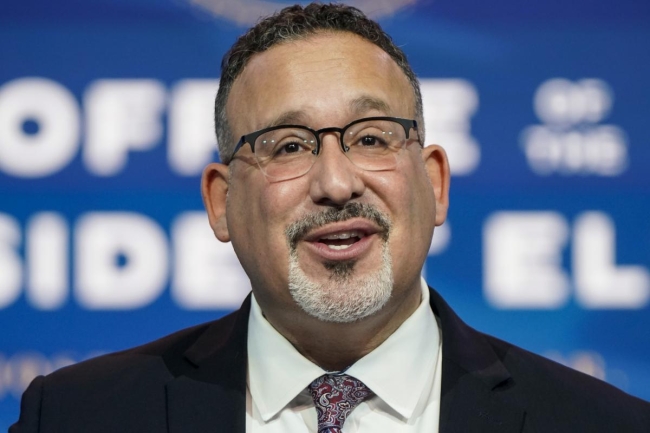You have /5 articles left.
Sign up for a free account or log in.

Secretary of Education Miguel Cardona said the extension would help borrowers plan for repayment to restart.
Joshua Roberts/Getty Images
The temporary pause on student loan repayment has been extended to January 31, 2022 for the final time, the Department of Education announced Friday. Repayments were originally scheduled to resume October 1, 2021.
This is the fourth time that the repayment pause has been extended since it was first enacted in March 2020 by the Coronavirus Aid, Relief and Economic Security Act. Under the pause, all student loan payments have been suspended, every borrower has had their interest rate set to zero percent and collections on defaulted loans have been paused.
The department said that with the additional time and a definitive end date, borrowers will be able to plan for the resumption of payments, reducing the risk of delinquency and defaults after the restart. It also said it will be working to facilitate a smooth transition for borrowers back into repayment, which includes improvements to student loan servicing.
"The payment pause has been a lifeline that allowed millions of Americans to focus on their families, health, and finances instead of student loans during the national emergency," said Secretary of Education Miguel Cardona in a release. "As our nation's economy continues to recover from a deep hole, this final extension will give students and borrowers the time they need to plan for restart and ensure a smooth pathway back to repayment."
Recent survey data has shown the extension for borrowers was likely necessary. An analysis by the Pew Charitable Trusts found that two-thirds of respondents to a survey conducted this past spring said it would be difficult for them to afford payments if they resumed a month from the date they took the survey. Another survey, conducted by Student Debt Crisis, showed that 90 percent of the nearly 24,000 borrowers surveyed said they were not ready to resume payments in October.
Advocates and Democratic lawmakers had been calling for the Biden administration to extend the pause for weeks, with many of them stating that a rush to resume loan repayments would be a recipe for disaster. The announcement was met with praise by many, though some with caveats. Meanwhile, Republican lawmakers criticized the decision.
Justin Draeger, president and CEO of the National Association of Student Financial Aid Administrators, said that while the organization welcomes the decision, the department must begin preparing for the restart immediately.
"Transitioning millions of borrowers back into repayment cannot be done by simply flipping a switch and may even require a phased implementation," Draeger said. "Delays cannot continue indefinitely, and we urge the Secretary of Education to use his authority under this national emergency to streamline repayment processes to the fullest extent possible, with the most beneficial terms and conditions as possible."
House Education and Labor Committee chair Bobby Scott, a Democrat from Virginia, also applauded the decision, saying that the extended pause will "help continue the momentum of our economic recovery and give student loan borrowers the time they need to boost their financial security before restarting."
Other Democratic lawmakers offered praise for the decision but still implored the administration to do more to address the student debt crisis. Senate Majority Leader Chuck Schumer of New York, Senator Elizabeth Warren of Massachusetts and Representative Ayanna Pressley of Massachusetts -- who have all been vocal about the need to extend the pause -- said that President Biden still needs to use executive action for widespread student debt cancellation.
"We're pleased the Biden administration has heeded our call to extend the pause on federally-held student loan payments, providing an enormous relief to millions of borrowers facing a disastrous financial cliff," the lawmakers said in a joint statement. "While this temporary relief is welcome, it doesn't go far enough. Student debt cancellation is one of the most significant actions that President Biden can take right now to build a more just economy and address racial inequity."
Student Debt Crisis also continued its calls for Biden to cancel student debt, urging him to take action before repayment resumes in January.
"While today's announcement provides some financial security for borrowers and their families as they recover from job losses, reduced hours or shut down businesses, the reality is that the president can do much more," said Natalia Abrams, executive director of Student Debt Crisis.
However, not all Democrats believe that Biden can unilaterally cancel student debt. House Speaker Nancy Pelosi, a Democrat from California, said last month that Biden could postpone or delay student loan debt, but the power to cancel it rests with Congress.
With some asking Biden to do more, others believe the administration has already done enough. Representative Virginia Foxx, a Republican from North Carolina and ranking member of the House Education and Labor Committee, said the administration should have worked with Congress to responsibly transition the student loan portfolio back into repayment by October 1.
"This extension does a grave disservice to borrowers across the country, and our children will pay the ultimate price for this irresponsible delay," Foxx said.
Senator Richard Burr, a Republican from North Carolina and ranking member of the Senate Health, Education, Labor and Pensions Committee, outlined that price in his critique of the decision, stating that "based on the cost of prior loan pauses, this extension will cost an estimated $20 billion to subsidize over the next four months, on top of the $76 billion already spent on the loan pauses over the last year and a half."
"Students and families faced immense challenges last year, but the American economy continues to recover and there is no rational excuse for continued extensions of non-payment on student loans," Burr said. "Today's action by the Biden Administration actively works against the interests of students, borrowers and taxpayers."




